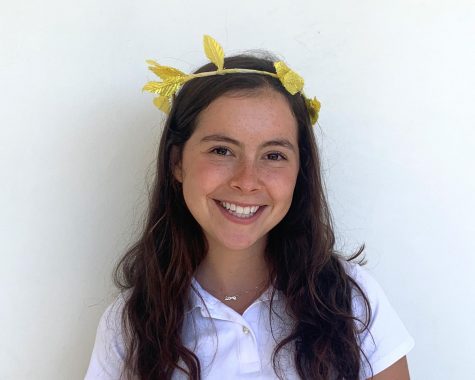‘Everywhere you see lights’: November 4 marks India’s largest holiday, Diwali
Photo credit: Kim Bajaj
Uma Bajaj, age 10, gets ready to perform for her fifth grade elementary class in celebration of Diwali in 2015. Uma Bajaj said, “Diwali is always such a special moment that allows me to connect with my family.”
November 9, 2021
Thursday, Nov. 4 and the 15th day of the Kartik month, marked Diwali, or Dipawali, an Indian Holiday otherwise known as the Festival of Lights, that celebrates the victory of good over evil. According to Britanica, it is considered India’s most important holiday of the year celebrated by Hindus, Jains and Sikhs.
Jagjit Bajaj, juniors Uma and Maya Bajaj’s grandfather, is from India, and has been celebrating Diwali since he was born.
“It’s a function which is celebrated all over the country, all over India,” Jagjit Bajaj said. “Almost everyone and every family celebrates the holiday unless they happen to be non-Hindus or they just don’t celebrate.”
As for junior Uma Bajaj, Diwali has always been an important part of her life; however, it was not until fifth grade when she began to understand the true meaning of the holiday and how it impacts her daily life.
“I rarely get to see my family from India, and on Diwali, I always make sure to call them or celebrate with them,” Uma Bajaj said. “I really enjoy the holiday because I am able to connect with all my family members I do not necessarily talk to a lot.”
Across India, according to National Geographic, more than a billion people of all different faiths celebrate Diwali, as it is a time to commemorate good over evil, knowledge over ignorance and light over darkness.
Many individuals who do not identify as Hindu have started honoring Diwali and participating in all of its festivities. According to Britanica, for the Jainism religion, which emphasizes nonviolence and practices reaching enlightenment, Diwali symbolizes the spiritual awakening of Lord Mahavira. The Sikh faith celebrates Diwali because it commemorates the sixth guru, Guru Harbogbing’s, release from prison and return to civilization. Guru Harbogbing’s release from prison began the tradition of lighting the Golden Temple, signifying the win of good over evil.
“I enjoy taking time to appreciate my Indian culture because I don’t normally do that on an everyday basis. This celebration allows me to appreciate my culture on a different level and learn more about my background,” Maya Bajaj said. “I feel like every year I learn more about the tradition from what my parents and grandparents tell me, and I am able to learn more and research more about it every year.”
Typical celebrations of Diwali include the lighting of diyas, smaller lamps that contain oil, and saying pujas, or prayers, to the various gods and goddesses in different Indian cultures. Other common celebrations include decorating and cleaning out homes and giving gifts.
“During Diwali, people clean up their houses, dress their children in new clothes, and buy sweets [that] are distributed to [their] friends and families,” Jagjit Bajaj said. “Of course there is also the religious aspect—there is a puja done for Diwali, which significantly signifies the victory of good over evil.”
Maya and Uma celebrate Diwali every year with their family and friends in Los Angeles as a way to connect to their culture and relatives in India.
“We enjoy eating Indian food and … lighting our house with candles,” Uma Bajaj said. “Sometime we go to other relatives homes during Diwali and they light up their houses and have a lot of family over with huge feasts … [and] time to exchange gifts.”
According to Maya Baja, Diwali continues to be a holiday that is consistently unacknowledged in schools across the country. Both Maya and Uma Bajaj have noticed the lack of acknowledgment in schools surrounding the holiday. Two years ago at Archer, a past faculty member, Avani Shah, gave a detailed presentation during an all-school assembly educating students about Diwali and how her and her family celebrate the holiday.
This year, Dean of Student Life, Equity and Inclusion Samantha Hazell-O’Brien, mentioned Diwali in her weekly all school email and provided a National Geographic video for students to learn more about the holiday. On Nov. 4, seventh grade history classes spent time reading a variety of articles about Diwali’s celebrations and traditions. This lesson is the only time Archer students learn about the history and importance of Diwali.
“I feel like all schools kind of skim over [Diwali] and don’t really go into depth,” Maya Bajaj said. “I think it is important to educate yourself and research about [Diwali] to understand what the holiday is and what it means to people in India and around the world.”




![Uma Bajaj, age 10, gets ready to perform for her fifth grade elementary class in celebration of Diwali [2015]. Uma Bajaj said, “Diwali is always such a special moment that allows me to connect with my family."](https://archeroracle.org/wp-content/uploads/2021/11/Screen-Shot-2021-11-07-at-9.45.57-PM-900x595.png)






Tiffany Smith-Anoa'i • Nov 9, 2021 at 4:58 pm
This is a beautiful piece and I learned a lot about Diwali, thanks to Mr. Bajaj. Great reporting Rose!